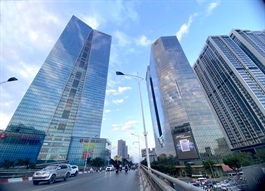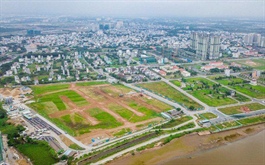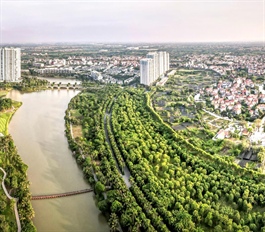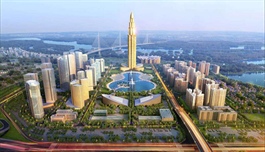Foreign-invested enterprises bemoan housing legal overlaps
Foreign-invested enterprises bemoan housing legal overlaps
Adjustment of regulations relating to building housing in trade union institutions in industrial parks could diversify housing supply sources for factory employees, which is a problem inherent to investors.

The Vietnam General Confederation of Labour (VGCL) has once again proposed that the government makes changes to Decision No.655/QD-TTg on housing in trade union institutions in industrial parks (IPs) and economic zones. The VGCL wants to have a harmonious cooperation mechanism between the VGCL, the people’s committee of localities and investors to build housing projects in trade union institutions in IPs.
Around half of Vietnam’s provinces have sites that can be used for trade union institutional housing, photo Le Toan
Le Van Nghia, head of the VGCL’s Project Management Board, noted that the 2017 decision approved projects to build trade union institutes in IPs. A trade union institution comprises a housing complex with cultural amenities, sports, kindergarten, and other aspects.
Nghia said that the confederation deployed the first such institute in the northern province of Ha Nam, but after finishing the first phase in 2019, it had to stop and adjust the entire project as the Law on Land regulated that socio-political organisations, including trade unions, are not allowed land to build social or worker housing projects.
According to the VGCL, 34 provinces introduced sites that could be used to build such institutes in their localities. However, work could not begin on these complexes because of planning issues and legal overlaps.
Explaining the barrier in implementing housing in trade union institutions, the head of the trade union of a South Korean-owned shoe manufacturer in the southern province of Dong Nai told VIR that the number of migrant workers in IPs are increasing, building up demand for accommodation and other utilities.
Thus, the VGCL proposed the government to establish trade union institutions to meet workers’ demands. According to the government’s approval, the VGCL would provide capital while localities and manufacturers would allocate land funds.
“The purpose was to provide low-cost accommodation for workers. However, during the implementation process, it may have a benefit conflict, in which real estate developers pay attention to the benefits from allocating land funds, instead of handing over land for free. This conflict has delayed the process of building housing in trade union institutions,” the union head explained.
A representative of a Bac Ninh industrial real estate developer said, “Many foreign-invested enterprises (FIEs) in our IPs are expecting new moves about housing for employees. The demand is considerable because major FIEs pay attention to the welfare and accommodation of their employees and expats. The problem is that the land in IPs is scarce, thus many industrial real estate developers want to use service land to build workshops to rent out. Enterprises hope that the VGCL’s proposal will be approved soon to extend housing for employees in IPs,” the representative said.
Statistics from the VGCL showed that approximately seven million labourers are working in 370 IPs and export and processing zones across the country. However, current housing is modest, just meeting approximately 30 per cent of demand. As of February, there were 63,000 apartments for workers in IPs.
Also in February, Prime Minister Pham Minh Chinh required relevant ministries and the State Bank of Vietnam to take measures to handle issues relating to housing for workers, including proposals to adjust land planning, incentive loans, and relevant procedures.
Furthermore, Decree No.35/2022/ND-CP dated May 2022 on the management of IPs and related zones in Vietnam also pays attention to the development of worker housing. The decree regulates that industrial real estate developers have to spend at least 2 per cent of the total IP area for residential aspects.
To be considered and approved for policies and IP infrastructure projects, developers must have planning to build residential areas, public services, and utility works for employees. In addition, putting into use housing and service facilities and public utilities for workers is one of the conditions for consideration of IP expansion.











